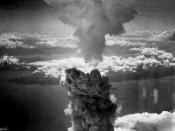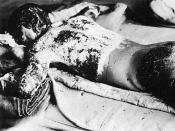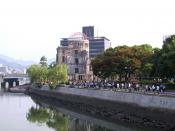"Then a tremendous flash of light cut across the sky . Mr. Tanimoto has a distinct recollection that it traveled from east to west, from the city toward the hills. It seemed like a sheet of sun. John Hersey, from Hiroshima, pp8
On August 6, 1945, the world changed forever. On that day the United States of America detonated an atomic bomb over the city of Hiroshima. Never before had mankind seen anything like. Here was something that was slightly bigger than an ordinary bomb, yet could cause infinitely more destruction. It could rip through walls and tear down houses like the devils wrecking ball. In Hiroshima it killed 100,000 people, most non-military civilians. Three days later in Nagasaki it killed roughly 40,000 . The immediate effects of these bombings were simple. The Japanese government surrendered, unconditionally, to the United States. The rest of the world rejoiced as the most destructive war in the history of mankind came to an end .
All while the survivors of Hiroshima and Nagasaki tried to piece together what was left of their lives, families and homes. Over the course of the next forty years, these two bombings, and the nuclear arms race that followed them, would come to have a direct or indirect effect on almost every man, woman and child on this Earth, including people in the United States. The atomic bomb would penetrate every fabric of American existence. From our politics to our educational system. Our industry and our art. Historians have gone so far as to call this period in our history the ÃÂatomic ageÃÂ for the way it has shaped and guided world politics, relations and culture.
The entire history behind the bomb itself is rooted in Twentieth Century physics. At the time of the bombing the science of...



Gush!
It was apparently a very long one. I mean your article was so long that you already frighten your readers. Try summarizing your ideas the next time.
0 out of 0 people found this comment useful.